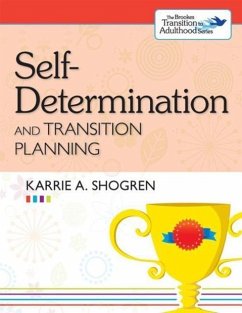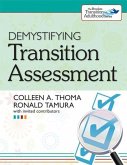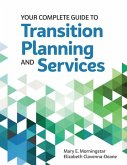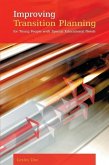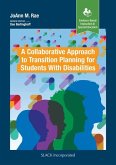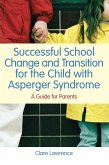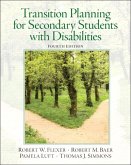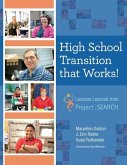- Broschiertes Buch
- Merkliste
- Auf die Merkliste
- Bewerten Bewerten
- Teilen
- Produkt teilen
- Produkterinnerung
- Produkterinnerung
Self-determination has a powerful positive impact on post-school outcomes for young adults with disabilities—but how can educators teach students the skills they need to make their own choices and achieve their goals as they enter adulthood? Packed with practical, research-validated guidance on explicitly teaching self-determination skills , this book helps educators support students in communicating their interests and needs, setting and reaching goals, and managing their own lives.
Andere Kunden interessierten sich auch für
![Demystifying Transition Assessment Demystifying Transition Assessment]() Colleen ThomaDemystifying Transition Assessment38,99 €
Colleen ThomaDemystifying Transition Assessment38,99 €![Your Complete Guide to Transition Planning and Services Your Complete Guide to Transition Planning and Services]() Mary E MorningstarYour Complete Guide to Transition Planning and Services38,99 €
Mary E MorningstarYour Complete Guide to Transition Planning and Services38,99 €![Improving Transition Planning for Young People with Special Educational Needs Improving Transition Planning for Young People with Special Educational Needs]() Lesley DeeImproving Transition Planning for Young People with Special Educational Needs38,99 €
Lesley DeeImproving Transition Planning for Young People with Special Educational Needs38,99 €![A Collaborative Approach to Transition Planning for Students with Disabilities A Collaborative Approach to Transition Planning for Students with Disabilities]() JoAnn M. RaeA Collaborative Approach to Transition Planning for Students with Disabilities112,99 €
JoAnn M. RaeA Collaborative Approach to Transition Planning for Students with Disabilities112,99 €![Successful School Change and Transition for the Child with Asperger Syndrome Successful School Change and Transition for the Child with Asperger Syndrome]() Clare LawrenceSuccessful School Change and Transition for the Child with Asperger Syndrome37,99 €
Clare LawrenceSuccessful School Change and Transition for the Child with Asperger Syndrome37,99 €![Transition Planning for Secondary Students with Disabilities Transition Planning for Secondary Students with Disabilities]() Robert FlexerTransition Planning for Secondary Students with Disabilities230,99 €
Robert FlexerTransition Planning for Secondary Students with Disabilities230,99 €![High School Transition That Works High School Transition That Works]() Maryellen DastonHigh School Transition That Works43,99 €
Maryellen DastonHigh School Transition That Works43,99 €-
-
-
Self-determination has a powerful positive impact on post-school outcomes for young adults with disabilities—but how can educators teach students the skills they need to make their own choices and achieve their goals as they enter adulthood? Packed with practical, research-validated guidance on explicitly teaching self-determination skills , this book helps educators support students in communicating their interests and needs, setting and reaching goals, and managing their own lives.
Hinweis: Dieser Artikel kann nur an eine deutsche Lieferadresse ausgeliefert werden.
Hinweis: Dieser Artikel kann nur an eine deutsche Lieferadresse ausgeliefert werden.
Produktdetails
- Produktdetails
- Verlag: Brookes Publishing Company
- Seitenzahl: 168
- Erscheinungstermin: 8. Mai 2013
- Englisch
- Abmessung: 280mm x 217mm x 9mm
- Gewicht: 431g
- ISBN-13: 9781598572698
- ISBN-10: 1598572695
- Artikelnr.: 37152334
- Herstellerkennzeichnung
- Libri GmbH
- Europaallee 1
- 36244 Bad Hersfeld
- gpsr@libri.de
- Verlag: Brookes Publishing Company
- Seitenzahl: 168
- Erscheinungstermin: 8. Mai 2013
- Englisch
- Abmessung: 280mm x 217mm x 9mm
- Gewicht: 431g
- ISBN-13: 9781598572698
- ISBN-10: 1598572695
- Artikelnr.: 37152334
- Herstellerkennzeichnung
- Libri GmbH
- Europaallee 1
- 36244 Bad Hersfeld
- gpsr@libri.de
Dr. Wehman is Professor of Physical Medicine with joint appointments in the Departments of Rehabilitation Counseling and also Special Education and Disability Policy at Virginia Commonwealth University. He serves as Chairman of the Division of Rehabilitation Research in the Department of Physical Medicine and Rehabilitation. Dr. Wehman has his Ph.D. in Behavioral Disabilities from University of Wisconsin-Madison. As one of the original founders of supported employment, he has worked closely with business and industry since 1980 and has published over 200 articles and authored or edited more than 40 books primarily in transition, severe disabilities, autism, traumatic brain injury and employment for persons with disabilities. He has been the Principal Investigator on 41 million dollars in grants during his career. As the father of two young adults with disabilities, he brings a strong parental as well as business perspective to his work. He is highly active in speaking to professionals, parents, advocates and businesses on transition and employment for people with autism, traumatic brain injury, spinal cord injury and other developmental disabilities. On a daily basis he works with individuals with disabilities, communicates regularly with professionals in the world of business related to disability and diversity, and is active in teaching and mentoring medical students, residents, and doctoral students in rehabilitation medicine, special education, rehabilitation and psychology. A major focus of Dr. Wehman's work is on expanding the partnerships with businesses of all sizes so that more persons with disabilities can gain entrance into the workplace and retain employment successfully. He is a recipient of the Kennedy Foundation Award in Mental Retardation in 1990 and President's Committee on Employment for Persons with Disabilities in 1992. Dr. Wehman was recognized as one of the 50 most influential special educators of the millennium by the Remedial and Special Education journal in December, 2000. He is also Editor-in-Chief of The Journal of Vocational Rehabilitation. Renee Cameto, Ph.D. Senior Social Science Researcher SRI International 333 Ravenswood Avenue Menlo Park, California 94025 Teresa Grossi, Ph.D., is Director of the Center on Community Living and Careers at the Indiana Institute on Disability and Community at Indiana University. Barbara Guy Transition/Work Experience Consultant Iowa Department of Education 400 East 14th Street Des Moines, Iowa 50319 Debra Hart is the Director of the Education and Transition Team for the Institute for Community Inclusion at the University of Massachusetts, Boston. She serves as the Principal Investigator for the NIDRR funded Center on Postsecondary Education for Individuals with Intellectual Disabilities, the ADD funded Consortium on Postsecondary Education for Individuals with Developmental Disabilities and Office of Postsecondary Education funded National Coordinating Center. Debra has over 25 years of experience working with youth and adults with disabilities, their families, faculty, and professionals that support youth in becoming contributing valued members of their community via participation in inclusive secondary and postsecondary education, and competitive employment. Since 1997, Ms. Hart has directed five federal grants designed to create access to postsecondary education for youth with intellectual disabilities. Peg Lamb, Ph.D. Director High School Diploma Completion Initiative Lansing Community College Post Office Box 40010 Lansing, Michigan 48901 Richard L. Rosenberg, Ph.D. Vocational Counselor Career Connection Whittier Union High School District 9401 South Painter Avenue Whittier, California 90605 Dr. David W. Test, Ph.D. Professor of Special Education at the University of North Carolina at Charlotte, teaches courses in single subject research, transition, classroom management, and professional writing. The majority of Dr. Test's publications have focused on self-determination, transition, community-based training, and supported employment. Along with Dr. Nellie Aspel and Dr. Jane Everson he wrote the first transition methods textbook titled Transition Methods for Youth with Disabilities. Dr. Test currently serves as a Co-Principle Investigator (with Dr. Paula Kohler and Dr. Larry Kortering) of the National Secondary Transition Technical Assistance Center, Co-Director on the North Carolina Indicator 14, Postschool Outcomes Project (with Dr. Claudia Flowers), and the UNC Charlotte Doctoral Leadership Personnel Preparation Program (with Dr. Diane Browder). He and Dr. Bob Algozzine currently serve as co-editors of Career Development for Exceptional Individuals. Michael L. Wehmeyer, Ph.D. is Professor of Special Education; Director, Kansas University Center on Developmental Disabilities; and Senior Scientist, Beach Center on Disability, all at the University of Kansas. He has published more than 25 books and 250 scholarly articles and book chapters on topics related to self-determination, special education, intellectual disability, and eugenics. He is s co-author of the widely used textbook Exceptional Lives: Special Education in Today's Schools, published by Merrill/Prentice Hall, now in its 7th Edition. His most recent book, co-authored with J. David Smith, is Good Blood, Bad Blood: Science, Nature, and the Myth of the Kallikaks, published by the American Association on Intellectual and Developmental Disabilities (AAIDD). Dr. Wehmeyer is Past-President (2010-2011) of the Board of Directors for and a Fellow of AAIDD; a past president of the Council for Exceptional Children's Division on Career Development and Transition (DCDT); a Fellow of the American Psychological Association (APA), Intellectual and Developmental Disabilities Division (Div. 33); a Fellow of the International Association for the Scientific Study of Intellectual and Developmental Disabilities (IASSIDD); and former Editor-in-Chief of the journal Remedial and Special Education. He is a co-author of the AAIDD Supports Intensity Scale, and the 2010 AAIDD Intellectual Disability Terminology, Classification, and Systems of Supports Manual. Karrie A. Shogren, Ph.D., Professor, Department of Special Education; Co-Director and Senior Scientist, Kansas University Center on Developmental Disabilities; Associate Director, Beach Center on Disability, University of Kansas, 1200 Sunnyside Avenue, Room 3136, Lawrence, KS 66045 Karrie A. Shogren is Professor of Special Education; Co-Director and Senior Scientist, Kansas University Center on Developmental Disabilities; and Associate Director, Beach Center on Disability, all at the University of Kansas. Dr. Shogren's research focuses on self-determination and systems of support for people with disabilities as well as applications of positive psychology and strengths-based approaches to people with intellectual and developmental disabilities; she has a specific interest in contextual factors that affect student outcomes. Her work focuses on developing and researching the efficacy and effectiveness of assessment and intervention approaches for students with and without disabilities to promote self-determination, with a particular focus on the role of these approaches in the transition to adult life and engagement in meaningful adult roles and responsibilities. Dr. Shogren has published more than 100 articles in peer-reviewed journals, is the author or coauthor of 10 books, and is a coauthor of Intellectual Disability: Definition, Classification, and Systems of Support, the 11th edition of the American Association on Intellectual and Developmental Disabilities' (AAIDD's) seminal definition of intellectual disability (formerly mental retardation). In addition, she is a coauthor of AAIDD's Supports Intensity Scale--Children's Version and Supports Intensity Scale--Adult Version. Dr. Shogren has received grant funding from several sources, including the Institute of Education Sciences and National Institute on Disability, Independent Living, and Rehabilitation Research. Dr. Shogren is Co-editor of Inclusion and Remedial and Special Education and Associate Editor of Research and Practice for Persons with Severe Disabilities. She has received the Council for Exceptional Children's Division for Research Distinguished Early Career Research Award and the American Association on Intellectual and Developmental Disabilities Early Career Award. Dr. Shogren completed bachelor and master's degrees in psychology at Ohio State University and the University of Dayton, respectively, and her doctoral degree at the University of Kansas.

